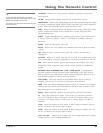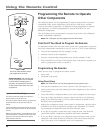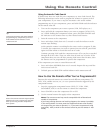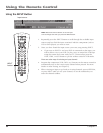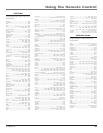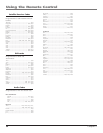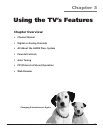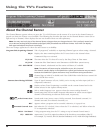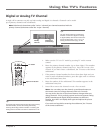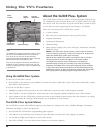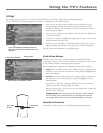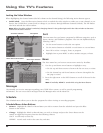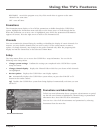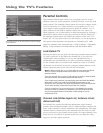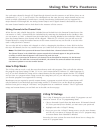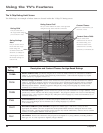
Using the TV’s Features
Chapter 3 37
Digital or Analog TV Channel
A single off-air antenna can pick up both analog and digital air channels. Channels can be made
up of primary channels and subchannels.
Note: Subchannels (sometimes called “minor” channels) are channels associated with the
primary channel (sometimes called the “major” channel).
1. Make sure the TV is in TV mode by pressing TV on the remote
control.
2. Enter the primary channel number (up to three digits). This number
appears in the primary channel entry box. Press OK or wait a few
seconds. If you don’t enter a subchannel, the TV tunes to the lowest
subchannel.
3. If the primary channel number has fewer than three digits and you
want to enter subchannel numbers, press the right arrow to advance
to the subchannel entry box.
4. Enter the number of the subchannel. This number appears in the
subchannel entry box.
5. Press OK to tune to the channel or wait a few seconds.
Notes: You can always use the channel up and down buttons on
the remote control to change channels within the TV mode.
You may notice the size of the channel banner changes when you
change channels. This is perfectly normal and occurs because analog
(NTSC) broadcasts and digital (ATSC) broadcasts use different
formats. Your HDTV can display both types and adjusts the picture
accordingly.
If you wait too long before entering the subchannel, the TV tunes
to the lowest subchannel.
Tip
If a digital and analog channel have the same primary
channel number, tune to the analog channel by
entering the analog channel number or entering the
analog channel number and then a subchannel of “0.”
Right arrow button
TV button
TV
AUX
DVD
SAT • CABLE
V
O
V
L
V
O
V
L
FORMAT
MUTE
CLEAR
VCR1
VCR2
ON • OFF
CH +
Primary
Channel
Subchannel
(if necessary)
Tip:
Use the channel banner to determine
whether a channel is digital or analog.
A digital (ATSC) channel has a dash and
second number after it (e.g., 21-1); an
analog channel doesn’t (e.g., Ch 21).



